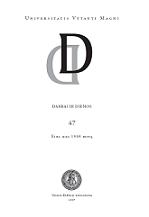Drama ir galia. Socialinis konfliktas ankstyvojo sovietmečio dramaturgijoje
Drama and power: social conflicts in the early dramaturgy of the soviet period
Author(s): Author Not SpecifiedSubject(s): History
Published by: Vytauto Didžiojo Universitetas
Keywords: Drama; power; social; conflicts; dramaturgy; soviet; period;
Summary/Abstract: The article discusses the relationship between power and drama as it is reflected in the representation of social conflicts by Lithuanian playwrights of the early Soviet period. Attitudes towards social conflicts distinguish democratic and totalitarian societies in the most fundamental ways. While the former consider conflicts an inevitable and positive phenomenon, the monistic Soviet view bears traces of a Utopian blueprint for a solid, unchanging society where the underlying conflict of all previous social formations, i.e. class conflict, has finally been eliminated. This ideological attitude affected Soviet theories of art, especially the dramatic arts, resulting in a set of unprecedented directive concepts, such as "optimistic tragedy", "non-antagonistic conflict", "struggle between the good and the better". Plays of social realism, written to reflect the post-war years of the Soviet state, produced a variety of dramatic strategies that helped to both create representations of a harmonious, stable society and drive out conflicts as something alien and destructive, no more than a relic of a past overcome. By analyzing plays of the forties and fifties, the author is able to demonstrate that there were four major strategies to eliminate conflict as an undesirable element of social life. Exteriorizing conflict involves turning it into a political contest between socialist and capitalist states; interiorizing it necessitates a strategy of representing social conflicts as mental deviations, i.e. as psychiatric problems; institutionalization expresses the point of view that every conflict can be successfully resolved by some superior power or institution; finally, "desublimation" demands that the warring group or individual be deprived of all historical and political context. On closer look, it seems that the same strategies were used by the Soviet government and the Communist party in order to deal with social reality.
Journal: Darbai ir dienos
- Issue Year: 2007
- Issue No: 47
- Page Range: 161-181
- Page Count: 21
- Language: Lithuanian

